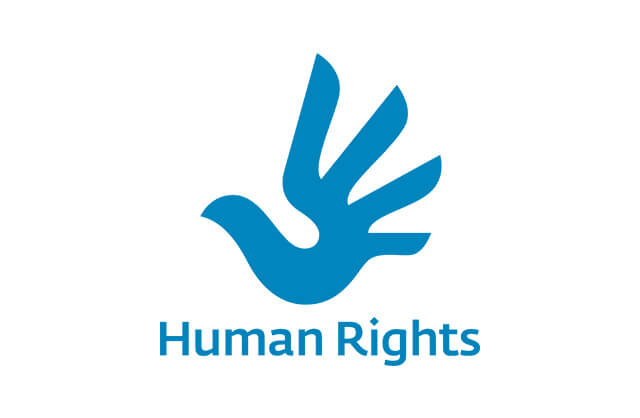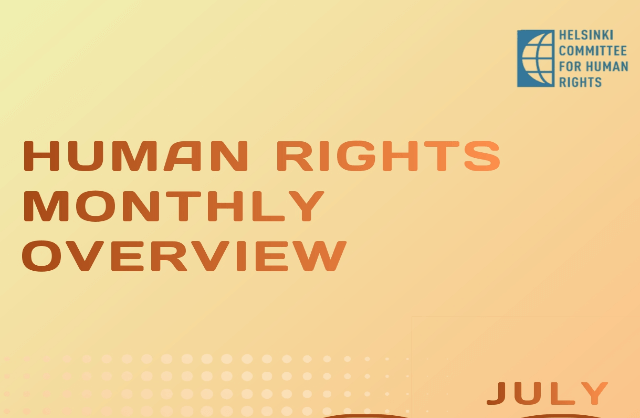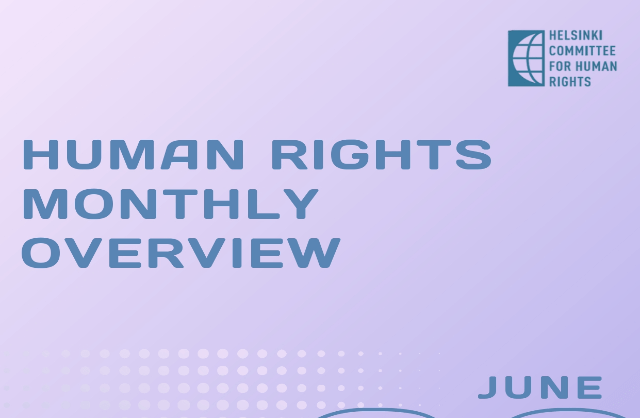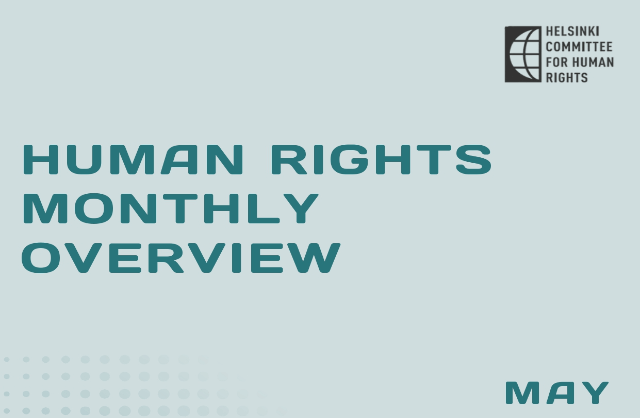Bimonthly Report (April – May 2011)
June 10, 2011

– PUBLIC DEVELOPMENTS AND VIOLATIONS OF DEMOCRATIC PRINCIPLES
– COURT CASES
– VIOLATIONS OF ECONOMIC AND SOCIAL RIGHTS
______________________________________________________________________________
PUBLIC DEVELOPMENTS AND VIOLATIONS OF DEMOCRATIC PRINCIPLES
– None of the authorities take on the responsibility for the Voters List!
– The Broadcasting Board vs. the Official Gazette of the Republic of Macedonia, who is better in their line of work
– Who benefits from the amendments to the Law on Health Insurance – the citizens or the Ministry of Health
______________________________________________________________________________
Early Elections 2011
“Double Bottom”
The very start of the election campaign for the upcoming parliamentary elections was marked by numerous controversies. The problems started with the single voters list and its correctness, followed by the (ab)use of the public administration for party missions, improper conduct by party activists and destroying of the political opponents’ electoral posters, a campaign accompanied by hate speech and many other shortcomings. All this has definitely created antagonism and polarisation among the citizens.
After the reports of shortcomings in the Voters List, which had persons who had no right to vote, the competent authorities instead of working on its clean up and dealing with the suspicions that emerged, they started a “war” between each other on who was authorised to do that.
The Electoral Code precisely states the duties of the Ministry of Interior, which is responsible for providing information regarding the individuals of legal age with a right to vote, the diseased, citizens with a right to vote who moved in or out, those who are temporarily working or staying abroad, citizens who lost their citizenship, etc.
On the other hand, the Electoral Code reads that the State Election Commission is responsible for checking the Voters List database, for registering, completing and deleting ex officio or upon a request by the citizens. In order to do this it needs data from the official records kept by the public institutions and public administration bodies.
The Ministry of Interior has fulfilled its legal duty within the stated deadline, but nonetheless the list was not cleaned up.
The cleaning of the Voters List stirred up a lot of fuss and the institutions claimed that it was always the others who were responsible for the shortcomings with the Voters List that evidently was a problem. There were obviously different interpretation of the legal provisions by these institutions.
Except for the problem with the Voters List that remained unsolved, the State Election Commission also kept silent in regard to the scandal concerning the Voters Lists and the abuse of the public administration on both national and municipal level, which instead of serving the citizens has become the main engine of the political parties.
The State Election Commission due to the division among the members has failed to deal with the challenges that could be seen as poor performance in office by its members.
It seems that the speech of politics during this pre-election period has hit the bottom. Even more it seems that this campaign has reminded us of a title of a famous writer “Double Bottom”. With over 60% of the speeches at relies were dedicated to attacks on people, groups and parties, this has become the greatest attack on the dignity of the citizens. There is no other way of interpreting this pushing out of fair and equal struggle for getting votes by using realistic offers instead of attacking the opponent. And 60% is not only hate speech, but it is also 60% disrespect of people’s intelligence. The abuse of primary school children means hitting the very bottom, failure of the political culture in our society.
Taught by these experiences we urge the legislators to introduce clarifications to the Electoral Code in regard to the obligation for cleaning up the Voters List and the electoral irregularities in order to avoid imprecision in the future that creates possibilities for abuse of the electoral process, something that has also been pointed out by the international organisations that attentively monitor this process. Furthermore, as the Committee has already underlined in a number of occasions, it is necessary to define hate speech in the legislation and to be sanctioned.
The Helsinki Committee urges the competent institutions to do their job impartially and to initiate proper procedure for the irregularities committed during the election campaigns.
The Broadcasting Board vs. the Official Gazette of the Republic of Macedonia, who is better in their line of work
How democracy is measured in the Republic of Macedonia, according to the rule of law or according to the dictatorship policy of the ruling structures
Just before the disbanding of the Assembly of the Republic of Macedonia and the announcement of the early parliamentary elections, the Broadcasting Council (hereinafter the BCC) had established as necessary in compliance with Article 75 of the Electoral Code to initiate a procedure for adopting certain sub-regulations. The BCC sent the draft rulebooks to all stakeholders for comments and remarks.
BCC announced that the Rulebook on the broadcasters’ conduct during and before the start of the election campaign should regulate the way journalists report about the elections preparations i.e. about the electoral activities in the period before the start of the election campaign. This Rulebook is a novelty in the electoral legislation and represents an obligation that emerged from the latest amendments to the Electoral Code. BCC even organised several round tables in order to polish up the regulations, the norms and the provisions in the rulebooks proposed by BCC. BCC also sent a request to the SEC for their opinion on this.
On 21 April 2011 BCC adopted the Rulebooks with a conclusion that even though they had requested an opinion from SEC they had not got one. They only received information that SEC had not discussed the draft rulebooks at their meeting and that the item had been removed from the agenda due to the requirement of additional information about the public debates that had been organised.
After the adoption of the rulebooks BCC submitted them to the Official Gazette of the Republic of Macedonia to be published. The Official Gazette neglecting the legal provisions envisaged with the Law on publishing laws and other regulations and acts in the “Official Gazette of the Republic of Macedonia” refused to publish the passed rulebooks.
Pursuant to the Law on the Official Gazette of the Republic of Macedonia i.e. in compliance with Article 5 and in regard to Article 3 Paragraph 1 Subparagraph 4 and Article 4 it simply was supposed to publish the regulations and acts adopted and submitted by BCC and it was not supposed to comment or demand additional information about the way they were adopted, their lawfulness or unlawfulness, etc.
The unlawful conduct by the Official Gazette of the Republic of Macedonia left an impression that we are not a democratic state with precisely defined principles of rule of law, and that legal sanctions needed to be imposed. For this purpose we urge all the competent institutions, the Public Prosecutor’s Office and the Ministry of Interior to undertake the necessary measures and actions for detecting the violations and to impose sanctions.
Who benefits from the amendments to the Law on Health Insurance – the citizens or the Ministry of Health
In compliance with the Law on Health Insurance the persons who are temporarily unemployed, while receiving pecuniary compensation from the Insurance in case of unemployment and the unemployed that actively look for a job are insured even though they have no other grounds for insurance.
However, with the amendments to the Law on Health Insurance adopted on 14 April 2011 the grounds for mandatory health insurance for the unemployed and those who actively look for a job was deleted. There are no grounds for this category of individuals to have health insurance just as is the case with those that have no mandatory health insurance. These provisions should go into effect on 1 September 2011.
According to the Constitution the citizens of the Republic of Macedonia have a right to social security, social protection and health care. Each citizen is guaranteed the right to health care. The right to health care the Constitution treats as a right that is in the interest of people and the community. Hence, every citizen has a right and an obligation to take care of and to improve one’s own health and the health of the others.
Setting off from these provisions in the Constitution this kind of amendment to the law should not have been allowed under any circumstances since it does not benefit the citizens but it could only harm them. Hence, we expect that this provision will be revoked by the Constitutional Court of the Republic of Macedonia as soon as possible. It only increases the number of documents that the citizens need for acquiring the right of an insured person and the time necessary to be able to exercise this right.
This proposal by the Ministry of Health was adopted in the absence of any analysis about the possible impact on the citizens and without thinking about the additional costs and problems it could impose.
According to the Ministry of Health the reason for proposing these amendments was the fact that in practice there were many individuals who fictitiously registered at the Employment Agency of the Republic of Macedonia as the simplest way of acquiring the statues of an insured person since otherwise they had to provide documents supporting their property profile. According to them, regardless of the fact that with the amendments to the Law on contributions for the mandatory social insurance the obligation for calculating and paying the contributions for health insurance for the unemployed is transferred from the Employment Agency of the Republic of Macedonia to the Health Insurance Fund of Macedonia, the fictitious number of unemployed persons in the state has not changed, yet.
Still if there are certain problems that the Ministry of Health has been faced with in the course of its activities, it needs to solve them in another way, and not to the disadvantage of the citizens’ health.
______________________________________________________________________________
COURT CASES
– The court case “Sopot” was reopened
The defendants from the so-called “Sopot” case are once again before the bar of justice
– The patience pays off, people say, but is this true in the case of Arben Lola
For the case of Arben Lola, a citizen of the Republic of Albania, with place of residence in Tetovo since 2003, the Helsinki Committee has written in some of its previous reports
______________________________________________________________________________
The court case “Sopot” is reopened
The defendants from the so-called case “Sopot” are once again before the bar of justice.
The Standing Inquiry Committee for Protection of Civil Freedoms and Rights adopted a conclusion that all possibilities should be revisited in order to reopen the closed court proceeding for the so-called case “Sopot” after the key witness in the proceedings claimed that the statement that burdened the defendants was forced on by the police by pressure, mistreatment and torture.
In the previous procedure the defendants were declared guilty and sentenced to a total of 150 years imprisonment for placing anti-tank mine in 2003 at the entrance of the village of Sopot, when two NATO soldiers and a civilian were killed as a consequence.
The competent court bodies decided to reopen the criminal proceedings, but now as part of a single case before the First Instance Court Skopje 1 – Skopje.
The few attempts for re-initiating the proceedings failed so finally the first court hearing about this case was held in April this year. The proceedings continue with a new hearing scheduled for May 2011.
The Helsinki Committee monitored the previous proceedings of the so-called “Sopot” case and announced that they would also monitor it during the repeating of the proceedings. If in the course of the monitoring violations of human rights are registered that could influence the final decision-making the Helsinki Committee is going to react adequately and timely.
The patience pays off, people say, but is this true in the case of Arben Lola
The Helsinki Committee has written about the case of Arben Lola, a citizen of the Republic of Albania with residence in Tetovo since 2003 in some of its previous reports.
In September 2006 Mr. Lola submitted a request for citizenship in compliance with Article 9 from the Law on Citizenship of the Republic of Macedonia. After almost two years on 26 March 2008 the Ministry of Interior adopted a Decision No. 17.9.1-52906/1-2006 refusing the request for citizenship of the Republic of Macedonia with a rationale that it could pose a threat to the security and defence of the Republic of Macedonia without any explanation and elaboration on the reasons for MOI to adopt such a decision.
Responding to the appeal timely submitted by the party, the Government of the Republic of Macedonia – Committee for deciding in the second instance administrative proceedings in the area of internal affairs, judiciary, public administration, local self-government and issues of religious character adopted the Decision UP II No. 35/II-169/1-2008 on 12 May 2008 in which they accepted the appeal and the first instance decision was annulled while the case was returned to be reviewed again.
On 17 December 2008 the Ministry of Interior adopted the Decision No. 17.9.1-52906/2-2006 that was absolutely identical to the previous one from 2006 when it decided for the first time based on the request.
Still unsatisfied with the decision Mr. Lala for the second time appealed to the second instance body, that after whole two years on 5 April 2011 adopted a Decision No. 35-4/2-2009 that accepted the appeal and the case was returned for the second time to be reviewed and decided on.
Just when you would have thought that patience pays off it seems that Mr. Lola’s golgotha starts all over again for the third time. It means the first-instance body needs to decide again, to be followed by an appeal and then once again possible returning for reviewing and deciding like in a vicious circle with no way out.
The Helsinki Committee publicly demands from the public institutions to undertake measures for this “magic” ping-pong situation, this going one step forward and three backward to stop and for the case of Mr. Lala to be resolved, while the party is referred to undertake the legal steps that he still has available.
______________________________________________________________________________
VIOLATIONS OF ECONOMIC AND SOCIAL RIGHTS
– The case of Sefadin Emini – is the right to court protection of the right to secondary education disputed?
The case of Sefadin Emini, is the right to court protection of the right to secondary education disputed?
The Helsinki Committee for Human Rights of the Republic of Macedonia in its reports for June 2008 and October 2008 has already informed the public about the ignored obstinacy of the religious educational institutions, more specifically of the Islam Secondary School “Isa Bey Medrese” in Skopje.
Briefly, it is a case in which the part-time third year student at the above-mentioned Islam school – Sefadin Emini whose secondary education was terminated by the school officials on 23 January 2008 when he tried to register for the exams, with a simple rationale by the School’s Principle that he was allegedly against the Islam community.
After Sefadin Emini reported the termination of his education to the State Education Inspectorate, but it declared itself incompetent to perform supervision at this school and referred for the problem to be resolved internally. For that reason the student Sefadin Emini in the course of May 2008 decided to go ahead with a legal suit in order for the decision to be revoked.
The Helsinki Committee for Human Rights addressed in writing the State Education Inspectorate, the Ministry of Education and Science, the Education Development Bureau and the Committee for relations with the religious communities and groups of the Government of the Republic of Macedonia regarding this case in order to familiarise them with the case as well as to inform us about the possible measures that could be undertaken for the purpose of looking into it. In the responses all the above public bodies informed us that the Islam secondary school based on the Law on Secondary Education is not part of the system of secondary schools, as well as that they were not competent to supervise it since “Isa Bey Medrese” school was a religious school and as such it was not verified and registered in the secondary schools registry.
For this reason the Committee on two occasions publicly expressed concern about this specific problem, the clear legal violations by the official bodies of the education administration and urged the judicial bodies to provide protection of the right to education and of the other rights that stem from it. Contrary to that the court has only deepened the problem.
The First Instance Court Kicevo passed on 23 April 2009 a Verdict adopting the legal suit of the plaintiff Sefadin Emini and annulled the decision of the acting Principle of the Islam Secondary School “Isa Bey Medrese” for expelling the plaintiff from the school. The Court of Appeal Gostivar acting on the appeal by the sued Islam Religious Community of the Republic of Macedonia adopted a decision accepting it and the Decision of the First Instance Court Kicevo was annulled. The case was returned to the first instance court for retrial. In addition, the Court of Appeal Gostivar in its decision underlined which lawsuit actions and disputable issues needed to be revisited by the first instance court in the course of the retrial.
The First Instance Court Kicevo in the retrial adopted a Verdict on 31 January 2011 stating that it was not competent deliver in the lawsuit of the plaintiff Sefadin Emini since in their view the sued school was not part of the system of secondary schools of the Republic of Macedonia and because of that the plaintiff needed to resolve the problem he had with the sued school internally, since the dispute was not a dispute under judicial competence. The plaintiff appealed against this decision timely and the procedure is underway.
And as the Committee has already pointed out the evident violation of a number of legal provisions by the public institutions primarily Article 3 of the Law on Secondary Education, as well as Articles 22, 23 and 26 from the Law on the Legal Position of the Church, the Religious Communities and Groups, it became even clearer that the application of the provisions in Articles 2, 4, 5 Paragraph 1 and 8 of the Law on the Courts is questionable, stripping the student of his right to court protection of his fundamental rights protected by the affirmative legal regulations and the Constitution of the Republic of Macedonia.
Consequently as a result of this way of exclusion of court protection without complete examination of the situation the question is whether the secondary education diplomas of all students enrolled at the religious schools should not be recognised having in mind the fact that the Court considered that they were not part of the educational system of the Republic of Macedonia. Is it possible for the religious schools to work outside the affirmative regulations in the Republic of Macedonia and to adopt decisions that violate the fundamental human rights, knowing that against such decisions there is no court protection? Especially, since the parents of all the enrolled students should be prosecuted in compliance with Article 118 Paragraph 4 of the Law on Secondary Education?
The Helsinki Committee demands an answer to the posed questions from the State Education Inspectorate, the Minister of Education and Science personally, as well as from the Judicial Council of the Republic of Macedonia regarding the actions of the court in this particular case. The State Education Inspectorate decided to inform us once again that it was not competent to supervise this school even though we were familiar with this position and we did not ask that question in our second address. We sincerely hope that the Minister of Education and Science and the Judicial Council of the Republic of Macedonia will not follow the example of the State Education Inspectorate and that we would get an answer for this problem. More specifically how to resolve this big collision of the above mentioned legal provisions in the referent area as well as the legal vacuum that exists in the educational system to the disadvantage of the rights of the citizens.


